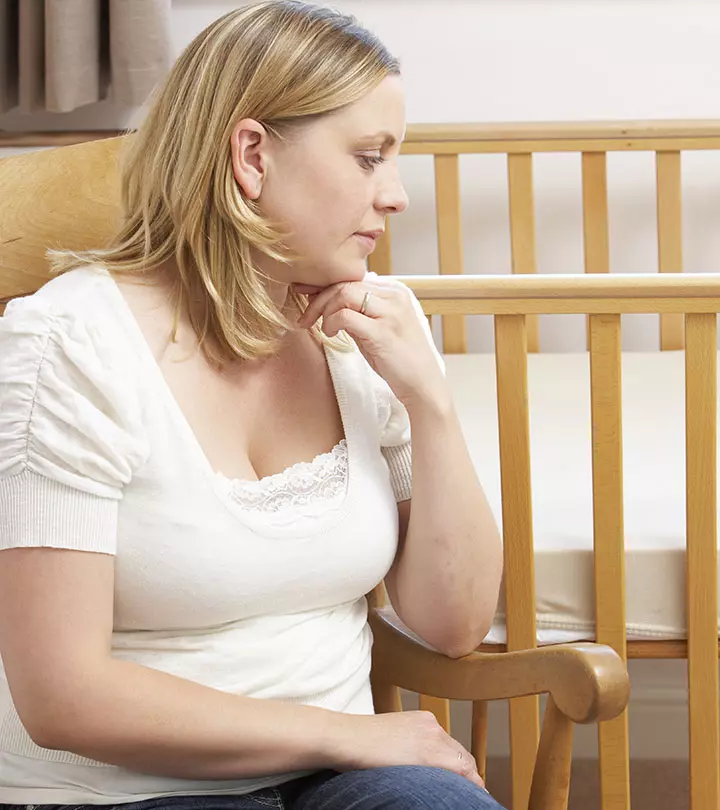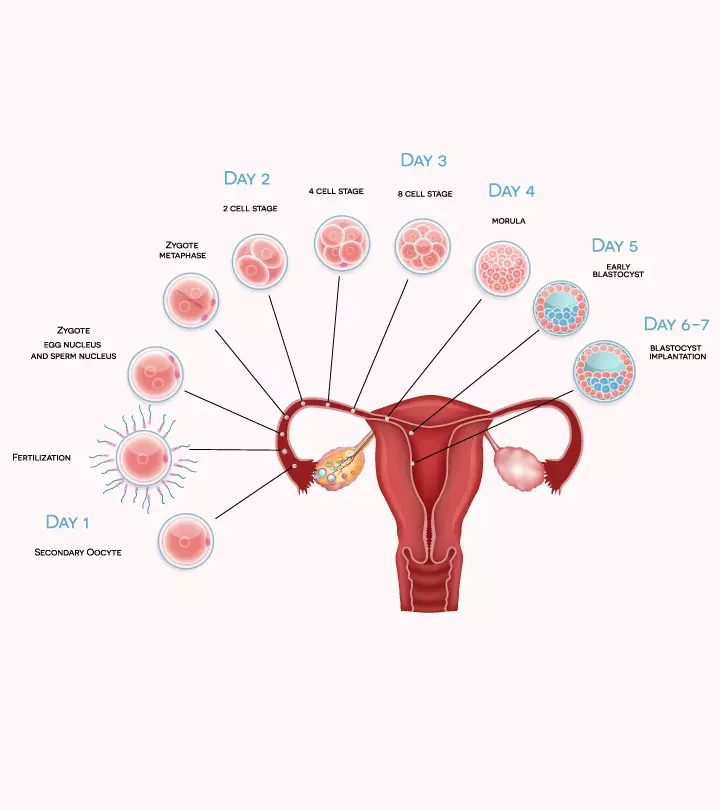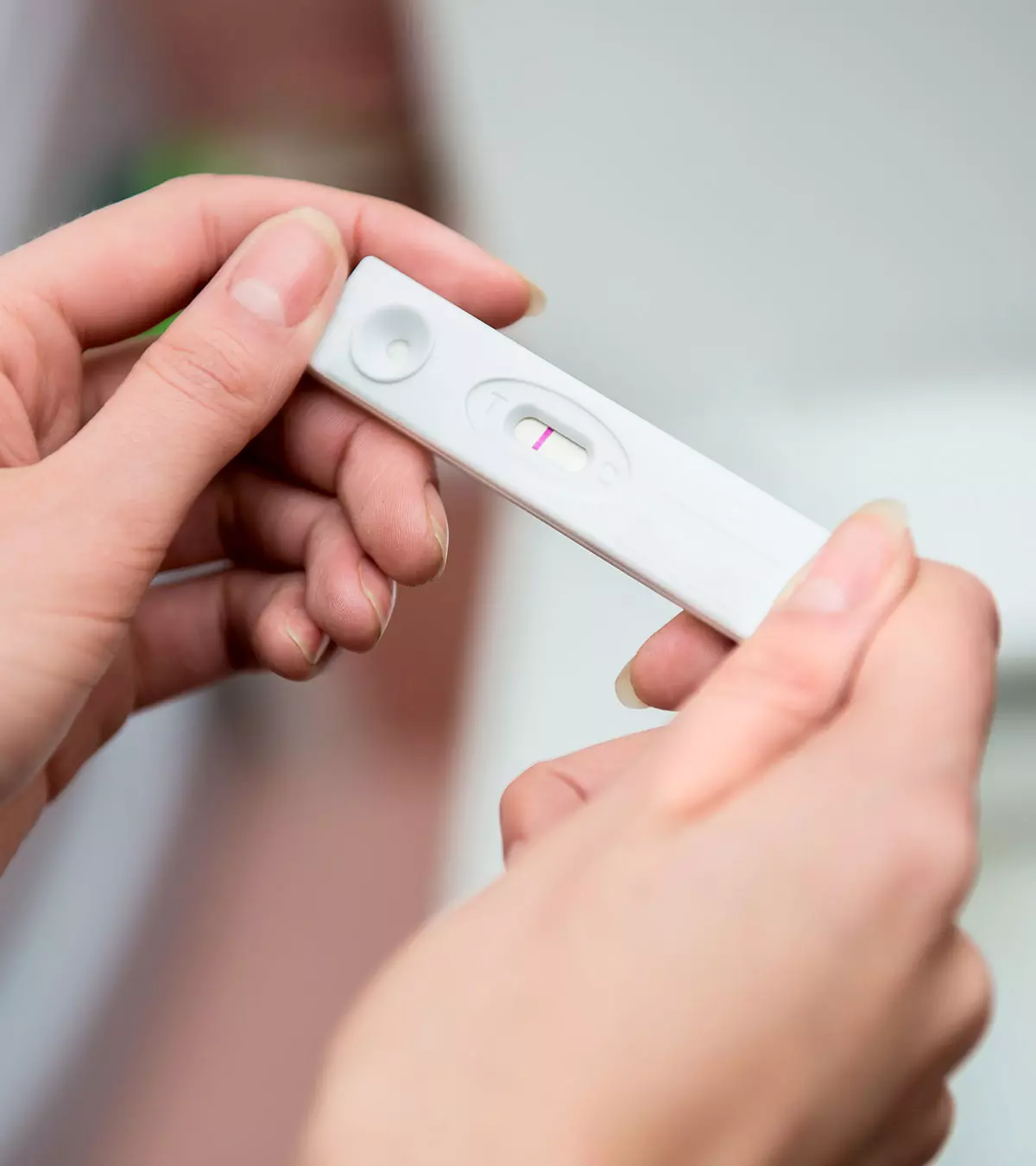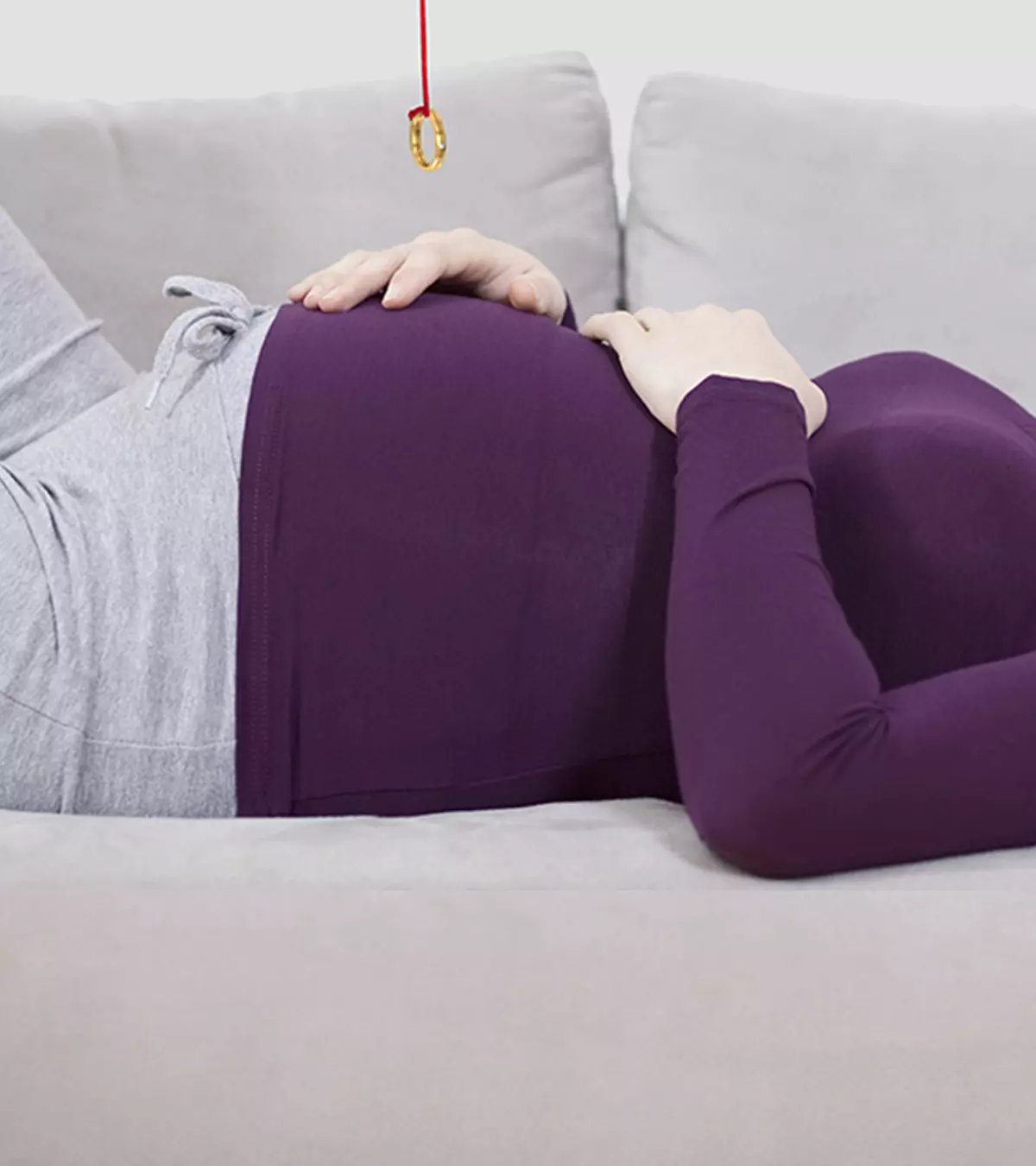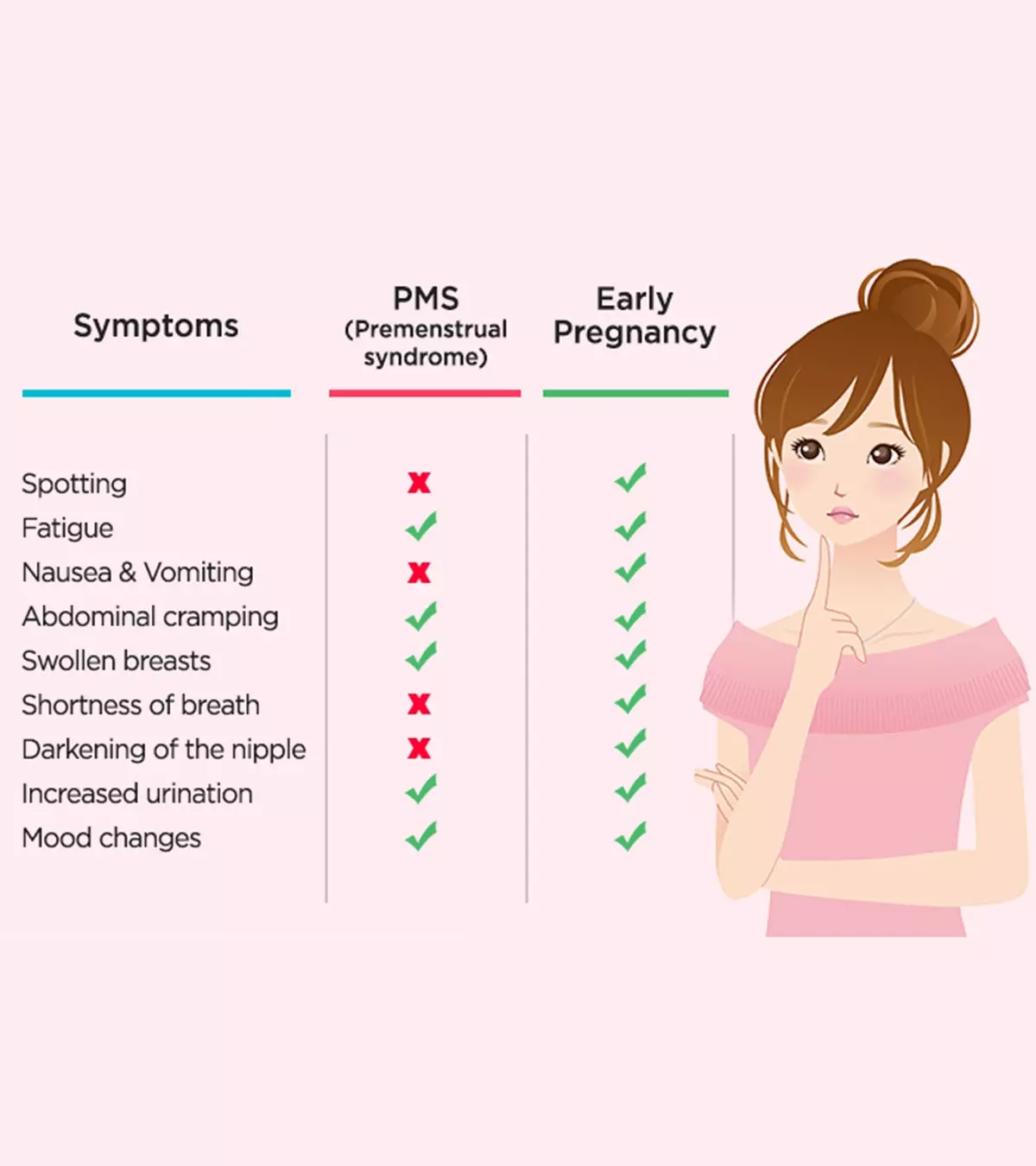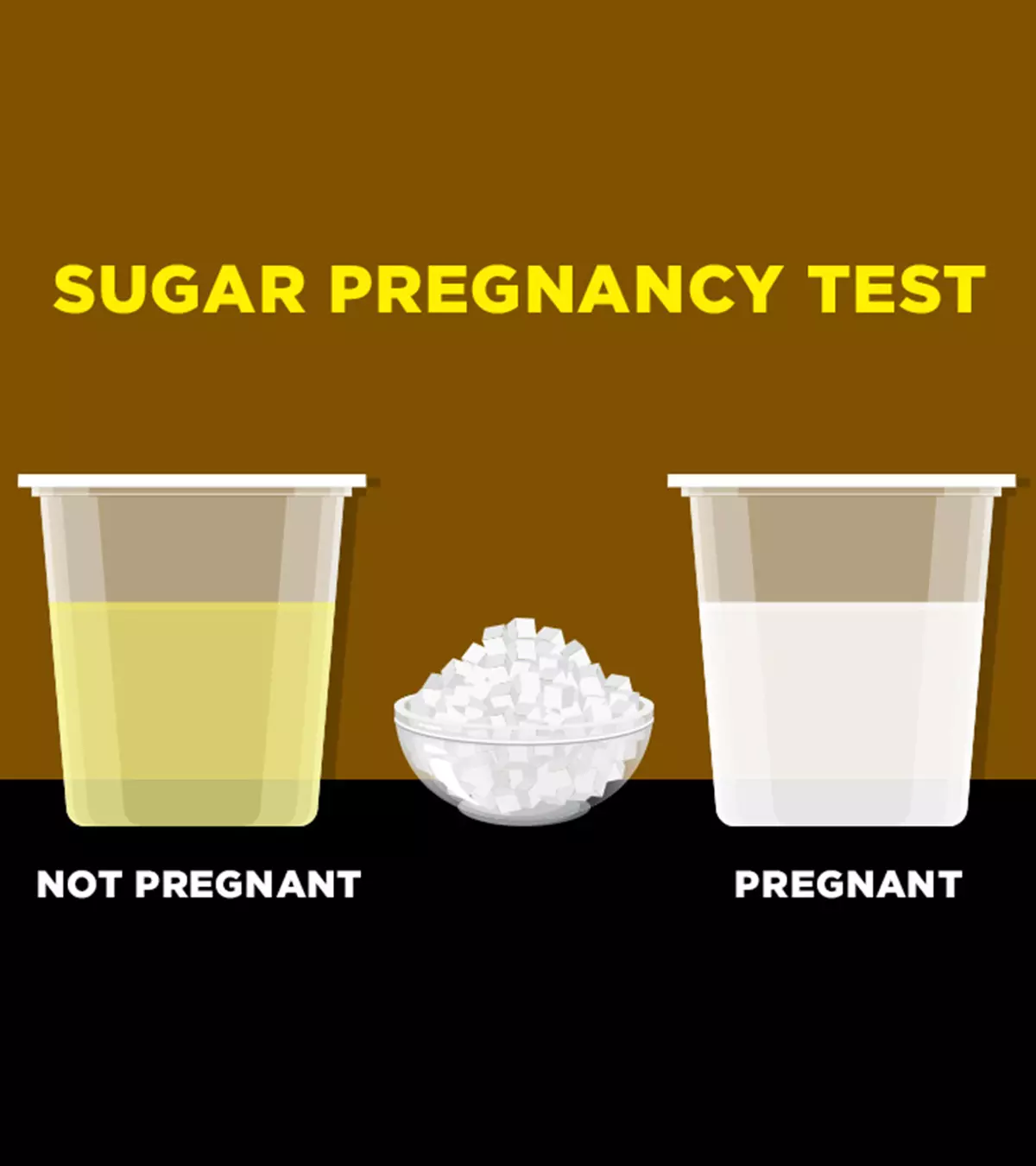
Image: ShutterStock
Most couples consider testing for pregnancy after a missed period, which is usually the first sign. Pregnancy can be confirmed using a home urine pregnancy test within a few days of the missed period. It is recommended to test in the morning hours since the hCG levels in urine may be higher due to less urination and water consumption during the sleeping hours.
There are also various causes for missed periods; hence, if the pregnancy test is negative, you may consult a doctor to know the exact cause. Read on to learn more about the chances of pregnancy after a missed period and early pregnancy symptoms.
Key Pointers
- Home urine tests for pregnancy may be effective a few days after a missed period.
- Early pregnancy symptoms may include fatigue, breast tenderness, heartburn, nausea, and mood swings, but may vary widely among different women.
- Implantation bleeding may appear as light spotting at about four weeks.
- Pregnancy glow and acne may appear at about 12 weeks of pregnancy.
- Hormonal changes may also cause gastric issues, food aversions, and cravings.
- Negative test results may indicate other causes for a missed period, and a doctor should be consulted for an accurate diagnosis.
20 Early Pregnancy Symptoms After Missed Periods
The early symptoms of pregnancy may vary from one woman to another.
Early Symptoms And Their Timeline During Pregnancy (1)
| Symptoms | Timeline (when it starts) |
|---|---|
| Mild cramping, light spotting | Week 4 |
| Nausea | Week 5 |
| Fatigue, morning sickness, tender breasts, frequent urination | Week 6 |
| Weight gain | Week 11 |
| Pregnancy glow, acne | Week 12 |
- Tender and swollen breasts: The hormonal fluctuations in the body make your breasts feel tender and sore. Once the body gets adjusted to the hormonal changes, the discomfort will subside in a few weeks (2).
- Light spotting: Light spotting of blood, also known as implantation bleeding, occurs after fertilization when the fertilized egg gets implanted into the uterine lining. It happens about 10 to 14 days (1-2 weeks) after conception, but not all pregnant women experience it (3).
- Morning sickness: It can start at any time, during the day or night. It begins around the 6th week in the first trimester, usually due to hormonal changes. This subsides as the pregnancy progresses, for most it settles after the first three months are over.
- Frequent urination: An increase in the blood levels causes the kidney to filter more fluid, leading to increased urination. However, it is important that you tell your gynecologists as UTI is common in early pregnancy and should be treated.
Sydney Antequera, a mother to three boys, shares her experience of frequently urinating during the early days of pregnancy. She says, “I was getting up to pee a lot during the night, which I never really do. I don’t really drink a lot of water and anything at night, so I thought that was pretty odd (i).”
 Point to consider
Point to consider
- Fatigue: An increase in the progesterone levels can make you feel tired. Also, the body is working more to meet the demands of your baby, making you feel tired.
- Moodiness: The hormonal changes in the body can take a toll on your mental health. You may feel emotionally adrift, which is common during the gestation period. Antequera adds, “I was overly emotional about everything. Even after seeing a movie, I started crying at the end. I typically cry during movies, but I was bawling.”
- Heartburn: The progesterone hormone relaxes the esophageal sphincter, which allows the gastric juices to flow upward into the esophagus and cause heartburn (4).
- Bloating: An increase in the progesterone level slows down the digestion process causing gas and bloating.
- Constipation: A slowdown in the digestion process due to hormonal fluctuations causes the food to move slowly in the digestive tract, which leads to constipation during pregnancy.
- Cramping: Mild uterine cramping can be experienced during the initial days, but not all women have this. Also, a heaviness in the lower abdomen is common.
- Headaches and dizziness: An increase in the blood level and hormonal changes make you dizzy and cause headaches. Also, low blood sugar level, dehydration, nasal congestion, and nausea could accompany a headache (5).
- Food aversions or cravings: It is common to develop an aversion to certain foods and smells in the prenatal period. Some women may have a craving for a particular food. All this is due to the hormonal changes happening in the body.

- Nasal congestion: An increase in the blood level leads to the swelling of nasal membranes. This allows more mucus to flow in and cause nasal congestion. The swelling of the membranes can also lead to nosebleeds.
- Lower backache: Some women may experience lower backache in early pregnancy. However, it becomes more prominent as the pregnancy proceeds.
- Acne: As the hormonal levels go up, the androgen level increases. This causes the sebaceous gland to secrete more oils that clog the pores, making room for bacterial growth which in turn gives rise to acne (6).
- Pregnancy glow: The influx of hormones increases the blood volume, and its circulation makes your skin brighter. It also causes the skin glands to secrete more oil, thus making it look shinier.

- Faster heartbeat: As the demand for oxygen and nutrients increases, the heart needs to work harder to pump in more blood for the fetus. The result is an increased heart rate (7).
- Metallic taste: Hormonal changes slow down the gustatory function, leading to taste changes during the initial phase of pregnancy. Once the hormonal levels are back to normal, you regain the tastes (8).
- Breathlessness: While it is more common as pregnancy progresses, breathlessness might occur in early pregnancy as well due to physiological changes in the body, such as hormonal fluctuations. The increased production of progesterone may have an effect on the respiratory system. A rise in its levels may cause expectant women to experience breathlessness, thus increasing their respiration rate (9).
- Excess saliva: Excessive saliva, also known as ptyalism or hypersalivation, is a condition where your mouth produces more saliva than usual, sometimes reaching one to two liters per day. Excess saliva in early pregnancy may be caused by hormonal changes or nausea. While not a universally experienced symptom, some pregnant women may notice a heightened salivary flow in the 8th week of pregnancy (10).
While these symptoms indicate pregnancy, they are not definitive. A pregnancy test is the only way to confirm a pregnancy. Relying only on the signs that you’re pregnant isn’t sufficient to know that you are expecting.
 Did you know?
Did you know?When To Take A Pregnancy Test?
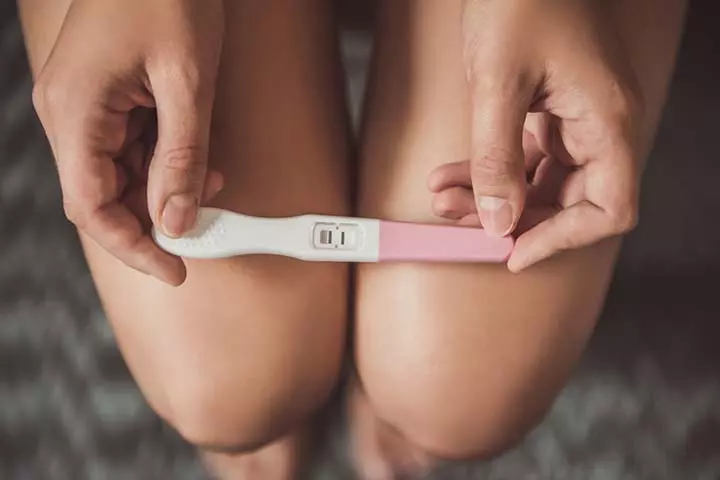
The ideal time for a pregnancy test is after you have missed the periods around four to five days overdue,do a home pregnancy kit test using the first urine sample in certain cases the body produces abnormally low levels of hCG. But the level of hormone is not sufficient enough to get detected on a home pregnancy kit. However, a blood test can help detect the hCG level even in its least concentration (11).
If you are planning to take a pregnancy test, then wait till you miss your periods to get a reliable result.
Frequently Asked Questions
1. Could I have the symptoms of early pregnancy and not be pregnant?
Yes. It is possible to experience pregnancy-like symptoms when you are not pregnant. Premenstrual syndrome (PMS), ovulation, and hormonal medications used in fertility treatments may cause symptoms resembling those of early pregnancy (12) (13) (14).
2. Is there any difference between PMS and pregnancy symptoms?
Many symptoms such as breast tenderness, mood swings, and fatigue are common between PMS and early pregnancy. However, nausea and vomiting are more closely associated with early pregnancy than PMS (12).
3. How accurate are home pregnancy tests after a missed period?
Home tests after a missed period can predict pregnancy with 99% accuracy when used correctly (15). However, the result must be confirmed through a medical examination.
4. How can I ensure a healthy pregnancy after a missed period?
Besides following up with routine checkups, you should quit or avoid alcohol and tobacco and get adequate physical activity along with a balanced diet and proper hydration to ensure a uniform weight gain for a healthy pregnancy (16).
5. When should I schedule my first prenatal appointment after a missed period?
You may schedule your first prenatal appointment when your home test reveals a positive pregnancy after a missed period. However, your healthcare provider may ask you to come between the eighth and tenth week from the first day of your last menstruation (17).
6. How can I calculate my due date if I have missed a period?
You may calculate your due date by following Naegele’s Rule. First, count back three months from the first day of your last period, then add one year and seven days to the date you counted back to. This gives you the probable due date (18).
7. What if my pregnancy test is negative, but I still have symptoms?
If your pregnancy test is negative but you’re having pregnancy symptoms, it may be too early to test, as your hormone levels might not be high enough to detect a pregnancy. Consider waiting a few days and retesting. If symptoms persist, consult a healthcare professional for further evaluation.
Recognizing the early signs of pregnancy is generally easy. Most women test for pregnancy after a missed period, which is the first sign. Although pregnancy can be exciting, the symptoms are equally uncomfortable and maybe give you a tough time, especially in the early days. These symptoms include heartburn, constipation, bloating, lower backache, and acne. Fortunately, these symptoms will subside once your hormonal level becomes normalized. Nevertheless, knowing about the different symptoms may help you stay calm when they appear and maintain a relaxed state of mind.
Infographic: Pregnancy Indicators If You Missed Your Periods
While there can be many reasons for missing your period, including stress and hormonal imbalance, if you had unprotected sex, the chances of being pregnant increase. Check out the following infographic on the possible early signs that may suggest you’re pregnant if you missed your period. However, take a pregnancy test to confirm it since many of these signs may indicate other problems.
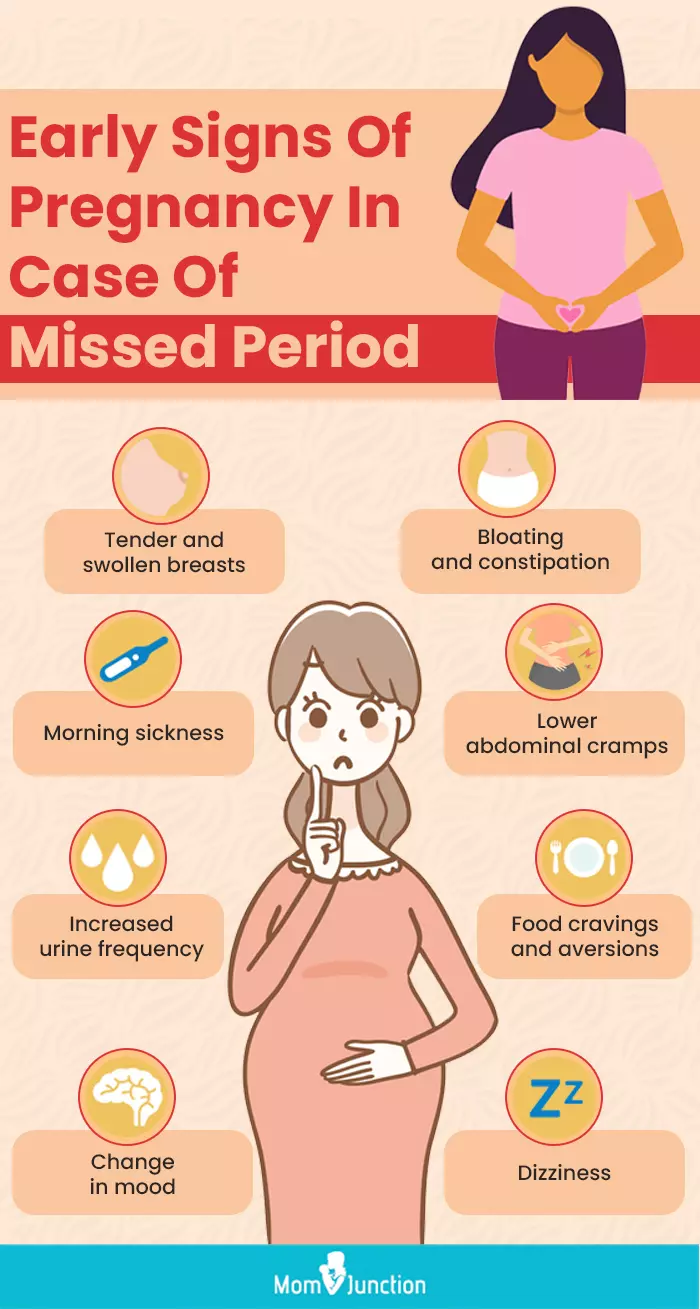
Illustration: Momjunction Design Team
Illustration: Early Signs Of Pregnancy After Missed Period
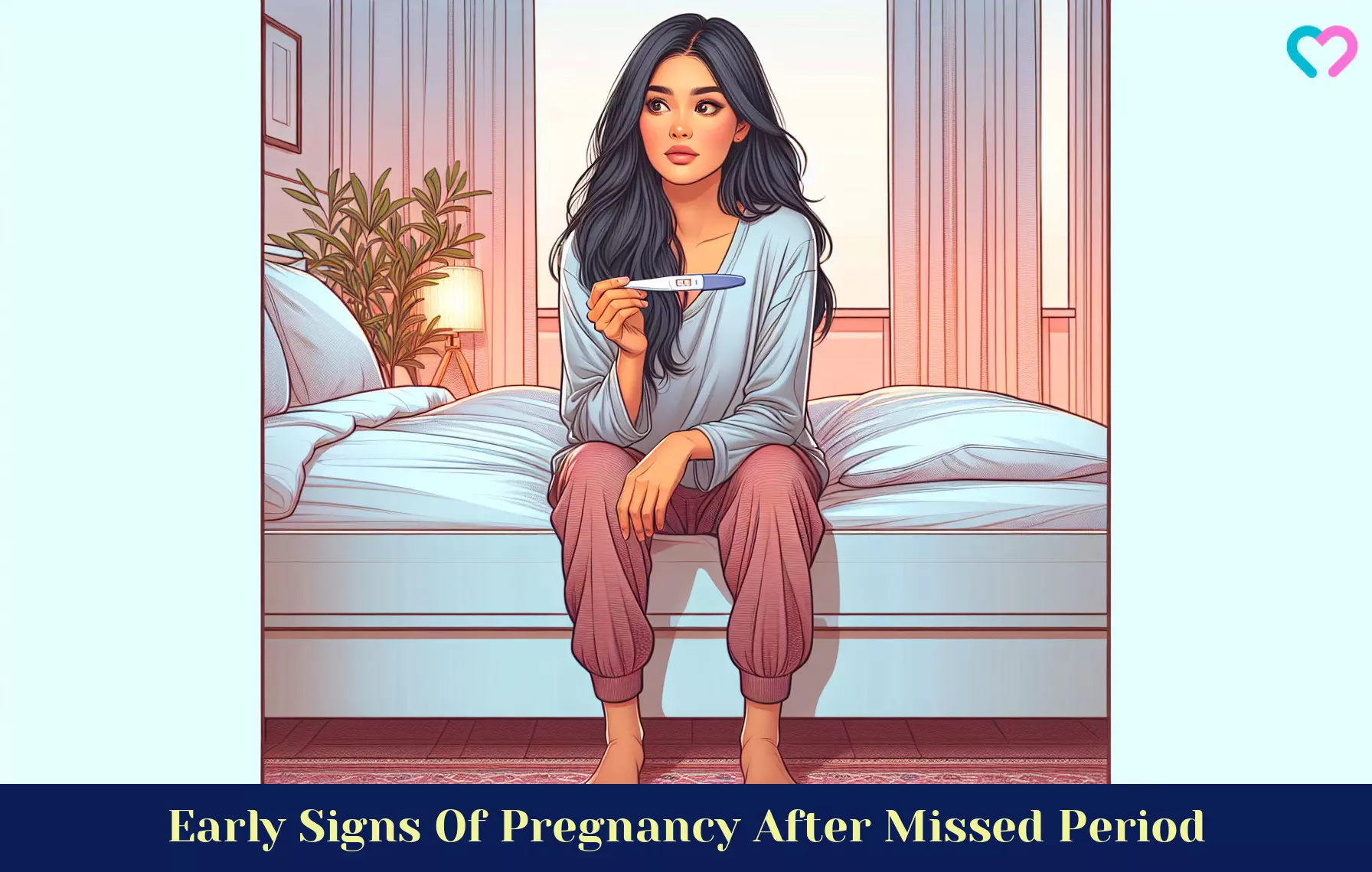
Image: Stable Diffusion/MomJunction Design Team
Personal Experience: Source
MomJunction articles include first-hand experiences to provide you with better insights through real-life narratives. Here are the sources of personal accounts referenced in this article.
i. My early pregnancy signs & symptoms (0-5 weeks) | how I knew I was pregnant before testing positive!;https://www.youtube.com/watch?v=4KRnSn_4dUc
References
1. A Week-by-Week Pregnancy Calendar; The Nemours Foundation (1995-2019)
2. Month by Month; Planned Parenthood Federation of America Inc (2019)
3. Bleeding During Pregnancy; American College of Obstetricians and Gynecologists (2019)
4. Pregnancy and Heartburn; Stanford Children’s Health (2019)
5. Headaches in Early Pregnancy; Stanford Children’s Health (2019)
6. Pregnancy and Skin Changes; Stanford Children’s Health (2019)
7. How’s your heart rate and why it matters?; Harvard University (2010-2019)
8. Kuga M, Ikeda M, Suzuki K, Takeuchi S; Changes in gustatory sense during pregnancy; NCBI (2002)
9. Shortness of Breath In Pregnancy; Harvard Medical School
10. How the Pregnancy Symptoms Change Throughout the Pregnancy ; Nanavati Max Super Speciality Hospital
11. Pregnancy tests; Healthdirect (2017)
12. Is it PMS or Am I Pregnant?; Pennmedicine, Lancaster General Health
13. Ovulation signs; Pregnancy Birth & Baby
14. Fertility Medications; American Pregnancy Association
15. Breast Changes During Pregnancy; American Pregnancy Association
16. Vaginal discharge during pregnancy; Pregnancy, birth and baby
17. Pregnancy Tests; Cleveland Clinic
18. Having a healthy pregnancy; Pregnancy, Birth, and Baby
19. Having a healthy pregnancy; Pregnancy, Birth and Baby
20. Your First Prenatal Appointment: What To Expect; Cleveland Clinic
20. Calculating a Due Date; Johns Hopkins University
Community Experiences
Join the conversation and become a part of our nurturing community! Share your stories, experiences, and insights to connect with fellow parents.
Read full bio of Dr. Meenu Vashisht Ahuja
Read full bio of Sakshi Mishra
Read full bio of Rebecca Malachi
Read full bio of Aneesha Amonz










